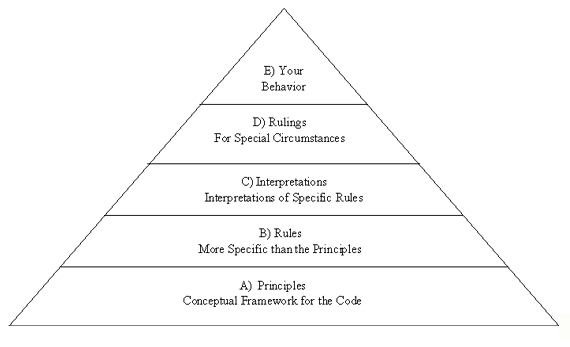Objectives: After completing this chapter you will:
• Know the six guiding principles in the AICPA Code of Professional Conduct.
• Discuss each of the principles as they relate to your practice.
• Understand the difference between the principles and the rules.
• Understand how to apply the rules to specific actions common to the CPA community.
The Code of Professional Conduct provides guidelines for accounting practitioners in the conduct of their professional affairs. A member of the AICPA must observe all the Rules of Conduct unless an exception applies. The need to observe the Rules of Conduct also extends to individuals who carry out tasks on behalf of an AICPA member. A member may be held responsible for a violation of the rules committed by fellow partners, shareholders, or any other person associated with him who is engaged in the practice of public accounting. The bylaws of the AICPA provide the basis for determining whether a member has violated the Rules of Conduct. If a member is found guilty of a violation, he or she may be admonished, suspended or expelled.
A member of the AICPA also must be aware of Interpretations of the AICPA Rules of Conduct. After public exposure, Interpretations of the AICPA Rules of Conduct are published by the Executive Committee of the Professional Ethics Division. Interpretations are not intended to limit the scope or application of the Rules of Conduct. A member of the AICPA who departs from the guidelines provided in the Interpretations has the burden of justifying such departure.
OBSERVATION: In performing an attest engagement, a member should consult the rules of his or her state board of accountancy, his or her state CPA society, the U.S. Securities and Exchange Commission (SEC) if the member’s report will be filed with the SEC, the U.S. Department of Labor (DOL) if the member’s report will be filed with the DOL, the AICPA SEC Practice Section (SECPS) if the member’s firm is a member of the SECPS, the General Accounting Office (GAO) if law, regulation, agreement, policy or contract requires the member’s report to be filed under GAO regulations, and any organization that issues or enforces standards of independence that would apply to the member’s engagement. Such organizations may have independence requirements or rulings that differ from (e.g., may be more restrictive than) those of the AICPA.

The AICPA ethics pronouncements can be thought of as a pyramid.
|
A) Principles
The six principles of the code of professional conduct provide the conceptual framework for the code. They are the cornerstone of ethical behavior.
B) Rules
The rules of the code of professional conduct are more specific than the six principles. Members must observe the rules.
C) Interpretations
Interpretations are issued by the AICPA to better explain the code of professional conduct. Only the principles and rules are cnsidered part of the code of professional conduct. Interpretations explain the code but are not part of it.
D) Rulings
The rulings apply the rules of conduct and interpretations to particular circumstances. AICPA members who depart from such rulings must justify their departures.
E) Your Behavior
The code, interpretations and rulings are meaningless if they do not impact your behavior. For this reason, your behavior is at the top of the pyramid.
|
|
|
|
|
|
|
Next Page: Principles and Rules


